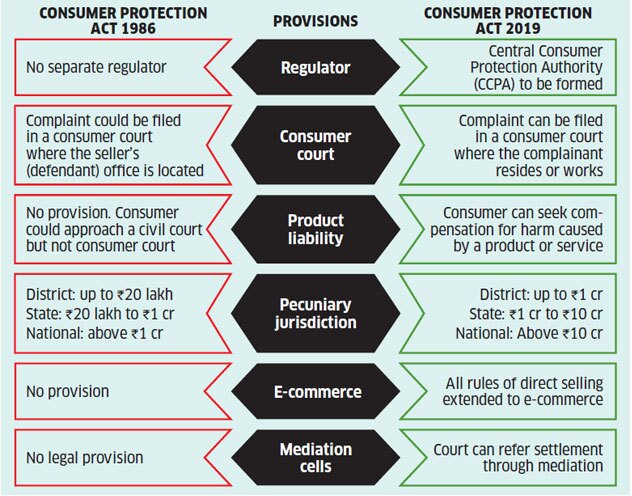Governance
Consumer Protection Act, 2019
- 21 Jul 2020
- 6 min read
Why in News
The new Consumer Protection Act, 2019 came into force on 20th July 2020 and it will empower consumers and help them in protecting their rights through its various notified rules and provisions.
- The new act will be swift and less time consuming compared to the older Consumer Protection Act, 1986 in which single-point access to justice was given making it a time-consuming exercise.
- The old act provided for a three-tier consumer dispute redressal machinery at the National (National Consumer Disputes Redressal Commission), State and District levels.
Key Points
- The Consumer Protection Act, 2019 establishes the Central Consumer Protection Authority (CCPA) whose primary objective will be to promote, protect and enforce the rights of consumers.
- It is empowered to:
- Conduct investigations into violations of consumer rights and institute complaints/prosecution.
- Order recall of unsafe goods and services.
- Order discontinuance of unfair trade practices and misleading advertisements.
- Impose penalties on manufacturers/endorsers/publishers of misleading advertisements.
- It is empowered to:
- Rules on E-commerce and Unfair Trade Practices: The government will notify the Consumer Protection (E-commerce) Rules, 2020 under the Act whose broad provisions are given below.
- E-commerce entities are required to provide information to consumers, relating to return, refund, exchange, warranty and guarantee, delivery and shipment, modes of payment, grievance redressal mechanism, payment methods, security of payment methods, charge-back options and country of origin.
- These are necessary for enabling the consumer to make an informed decision at the pre-purchase stage.
- These platforms will have to acknowledge the receipt of any consumer complaint within 48 hours and redress the complaint within one month from the date of receipt. They will also have to appoint a grievance officer for consumer grievance redressal.
- The Consumer Protection (E-commerce) Rules, 2020 are mandatory and are not advisories.
- Sellers cannot refuse to take back goods or withdraw services or refuse refunds, if such goods or services are defective, deficient, delivered late, or if they do not meet the description on the platform.
- The rules also prohibit the e-commerce companies from manipulating the price of the goods or services to gain unreasonable profit through unjustified prices.
- E-commerce entities are required to provide information to consumers, relating to return, refund, exchange, warranty and guarantee, delivery and shipment, modes of payment, grievance redressal mechanism, payment methods, security of payment methods, charge-back options and country of origin.
- Product Liability:
- A manufacturer or product service provider or product seller will be held responsible to compensate for injury or damage caused by defective product or deficiency in services
- Basis for product liability action:
- Manufacturing defect.
- Design defect.
- Deviation from manufacturing specifications.
- Not conforming to express warranty.
- Failing to contain adequate instructions for correct use.
- Service provided-faulty, imperfect or deficient.
- Punishment for Manufacture or Sale of Adulterated/Spurious Goods:
- In case of the first conviction, a competent court may suspend any licence issued to the person for a period of up to two years and in case of second or subsequent conviction, may cancel the licence permanently.
- Alternate Dispute Resolution Mechanism of Mediation:
- A complaint will be referred by a Consumer Commission for mediation, wherever scope for early settlement exists and parties agree for it.
- The mediation will be held in the Mediation Cells which will be established under the aegis of the Consumer Commissions.
- There will be no appeal against settlement through mediation.
- Simplification of the Consumer Dispute Adjudication Process:
- Empowering the State and District Commissions to review their own orders.
- Enabling a consumer to file complaints electronically and in consumer commissions that have jurisdiction over the place of his residence.
- Video-conferencing for hearing and deemed admissibility of complaints if the question of admissibility is not decided within the specified period of 21 days.
- Other Rules and Regulations:
- As per the Consumer Disputes Redressal Commission Rules, there will be no fee for filing cases up to Rs. 5 lakh.
- The credit of the amount due to unidentifiable consumers will go to the Consumer Welfare Fund (CWF).
- State Commissions will furnish information to the Central Government on a quarterly basis on vacancies, disposal, the pendency of cases and other matters.
- Apart from these general rules, there are Central Consumer Protection Council Rules, provided for the constitution of the Central Consumer Protection Council (CCPC).
- It will be an advisory body on consumer issues, headed by the Union Minister of Consumer Affairs, Food and Public Distribution with the Minister of State as Vice Chairperson and 34 other members from different fields.
- It will have a three-year tenure and will have Minister-in-charge of consumer affairs from two States from each region- North, South, East, West, and North-East Region.






-min.jpg)